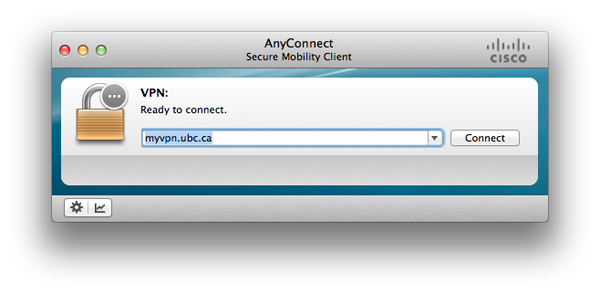| Developer(s) | Cisco Systems |
|---|---|
| Stable release |
|
| Preview release | |
| Operating system | Windows, Mac OS X 10.4 and 10.5, Solaris UltraSPARC, Linux (Intel)[3] |
| Size |
|
| Available in | English |
| Type | VPN software |
| License | Proprietary |
| Website | www.cisco.com/c/en/us/products/security/vpn-endpoint-security-clients/index.html |
OpenConnect-gui is the graphical client of OpenConnect for the Microsoft Windows system (or any other system Qt and OpenConnect run at). OpenConnect is a VPN client, that utilizes. With the CISCO AnyConnect SSL VPN protocol. I currently have and use the official Cisco AnyConnect Client. When I connect to it all it asks me for is my username and password. When I try to connect to the same server using the package from network-manager-openconnect-gnome it looks like this. Cisco Anyconnect CSD wrapper for OpenConnect (exhanced to autodownload and autoupdate hostscan).
Cisco Systems VPN Client is a software application for connecting to virtual private networks based on Internet Key Exchange version 1.
On July 29, 2011, Cisco announced the end of life of the product. No further product updates were released after July 30, 2012, and support ceased on July 29, 2014.[4] The Support page with documentation links was taken down on July 30, 2016, replaced with an Obsolete Status Notification.[5]
Availability and compatibility[edit]
The software is not free but is often installed on university and business computers in accordance with a site-license. As with most corporate licenses, administrators are allowed to freely distribute the software to users within their network.
The open-source vpnc client can connect to most VPNs supported by the official client.
VPN Client 4.9.01.0230 beta added support for Mac OS X 10.6.[6] Stable version 4.9.01.0180 appears to lack that support; 4.9.00.0050 explicitly did not support versions of Mac OS X later than 10.5.[7]
VPN Client 5.0.07.0290 added support for 64-bit versions of Windows Vista and Windows 7.[8]
Security[edit]
The client uses profile configuration files (.pcf) that store VPN passwords either hashed with type 7, or stored as plaintext. A vulnerability has been identified,[9] and those passwords can easily be decoded using software or online services.[10] To work around these issues, network administrators are advised to use the Mutual Group Authentication feature, or use unique passwords (that aren't related to other important network passwords).[9]
See also[edit]
- Cisco ASA, the product line that replaced Cisco VPN Concentrator on the server side
References[edit]
- ^VPN Client release notes
- ^Cisco VPN Client v4.x ... Mac OS
- ^'VPN Client Homepage'.
- ^https://www.cisco.com/c/en/us/products/collateral/security/vpn-client/end_of_life_c51-680819.html
- ^[1]
- ^Release Notes for VPN Client, Release 4.9.01.0230 Beta for Mac OS X
- ^Release Notes for VPN Client, Release 4.9.00.0050 for Mac OS X, Revised: May 21, 2010, OL-11179-04
- ^Release Notes for Cisco VPN Client, Release 5.0.07.0290
- ^ ab'Cisco Security Notice: Cisco IPsec VPN Implementation Group Password Usage Vulnerability'.
- ^'Cisco Systems VPN Client Group Password Decoder'.
OpenConnect SSL VPN software was created to allow remote users and employees to securely connect to a Cisco, Juniper or Palo Alto SSL VPN gateway running in an enterprise environment from Linux systems..
OpenConnect is not officially supported by these network vendors (Cisco Systems, Juniper Networks, Pulse Secure, or Palo Alto Networks), However, if you’re using a Linux machine with no official or limited support, you should look at OpenConnect SSL VPN client instead to help you connect to your company’s VPN gateway…
Employees can use OpenConnect SSL VPN client to connect, and if authentication is approved, the connected users or employees are grant access to internal resources..
To learn how to install the official Cisco’s AnyConnect SSL VPN client, read this post..
This post shows you how to install OpenConnct SSL VPN client on Ubuntu 18.04 or 16.04 and connect to popular VPN server gateway…
When you’re ready to install OpenConnect, follow the steps below:
Step 1: Install OpenConnect
OpenConnect SSL VPN client is included with Ubuntu repositories by default… No additional software and configurations needed to get the package..
Simply use the commands below to install OpenConnect on Ubuntu machines..
Step 2: Connect to SSL VPN Servers
Once OpenConnect package has been successfully installed on Ubuntu, you should be ready to connect to SSL VPN servers, which can Cisco’s AnyConnect SSL VPN and Juniper Pulse Connect Secure…
Simply run the commands below to establish VPN connection to your VPN server gateway… In this example, our VPN gateway is vpn.example.com
sudo openconnect -u user --passwd-on-stdin vpn.example.com
Replace vpn.example.com with the gateway of your SSL VPN gateway server name or IP… Press enter to initiate the connection… if the server is up, you should be prompted for a password to authenticate….

After a successful connection and authentication, you should see similar message as below:
Openconnect Cisco Remote
That’s it! You’re not connected and can use internal resources from your Linux machine…
Openconnect Cisco Email
Congratulations! You have successfully installed and configure OpenConnect to access Cisco and other VPN providers gateway…
Openconnect Gui Windows
You may also like the post below:
